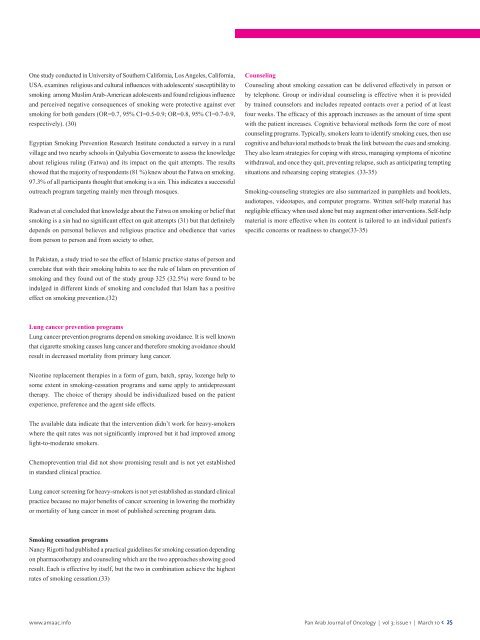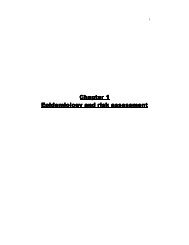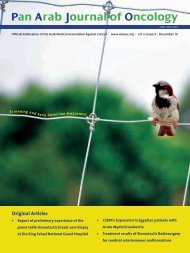Pan Arab Journal of Oncology - Arab Medical Association Against ...
Pan Arab Journal of Oncology - Arab Medical Association Against ...
Pan Arab Journal of Oncology - Arab Medical Association Against ...
You also want an ePaper? Increase the reach of your titles
YUMPU automatically turns print PDFs into web optimized ePapers that Google loves.
One study conducted in University <strong>of</strong> Southern California, Los Angeles, California,<br />
USA. examines religious and cultural influences with adolescents' susceptibility to<br />
smoking among Muslim <strong>Arab</strong>-American adolescents and found religious influence<br />
and perceived negative consequences <strong>of</strong> smoking were protective against ever<br />
smoking for both genders (OR=0.7, 95% CI=0.5-0.9; OR=0.8, 95% CI=0.7-0.9,<br />
respectively). (30)<br />
Egyptian Smoking Prevention Research Institute conducted a survey in a rural<br />
village and two nearby schools in Qalyubia Governorate to assess the knowledge<br />
about religious ruling (Fatwa) and its impact on the quit attempts. The results<br />
showed that the majority <strong>of</strong> respondents (81 %) knew about the Fatwa on smoking.<br />
97.3% <strong>of</strong> all participants thought that smoking is a sin. This indicates a successful<br />
outreach program targeting mainly men through mosques.<br />
Radwan et al concluded that knowledge about the Fatwa on smoking or belief that<br />
smoking is a sin had no significant effect on quit attempts (31) but that definitely<br />
depends on personal believes and religious practice and obedience that varies<br />
from person to person and from society to other,<br />
In Pakistan, a study tried to see the effect <strong>of</strong> Islamic practice status <strong>of</strong> person and<br />
correlate that with their smoking habits to see the rule <strong>of</strong> Islam on prevention <strong>of</strong><br />
smoking and they found out <strong>of</strong> the study group 325 (32.5%) were found to be<br />
indulged in different kinds <strong>of</strong> smoking and concluded that Islam has a positive<br />
effect on smoking prevention.(32)<br />
Lung cancer prevention programs<br />
Lung cancer prevention programs depend on smoking avoidance. It is well known<br />
that cigarette smoking causes lung cancer and therefore smoking avoidance should<br />
result in decreased mortality from primary lung cancer.<br />
Nicotine replacement therapies in a form <strong>of</strong> gum, batch, spray, lozenge help to<br />
some extent in smoking-cessation programs and same apply to antidepressant<br />
therapy. The choice <strong>of</strong> therapy should be individualized based on the patient<br />
experience, preference and the agent side effects.<br />
The available data indicate that the intervention didn’t work for heavy-smokers<br />
where the quit rates was not significantly improved but it had improved among<br />
light-to-moderate smokers.<br />
Chemoprevention trial did not show promising result and is not yet established<br />
in standard clinical practice.<br />
Lung cancer screening for heavy-smokers is not yet established as standard clinical<br />
practice because no major benefits <strong>of</strong> cancer screening in lowering the morbidity<br />
or mortality <strong>of</strong> lung cancer in most <strong>of</strong> published screening program data.<br />
Smoking cessation programs<br />
Nancy Rigotti had published a practical guidelines for smoking cessation depending<br />
on pharmacotherapy and counseling which are the two approaches showing good<br />
result. Each is effective by itself, but the two in combination achieve the highest<br />
rates <strong>of</strong> smoking cessation.(33)<br />
Counseling<br />
Counseling about smoking cessation can be delivered effectively in person or<br />
by telephone. Group or individual counseling is effective when it is provided<br />
by trained counselors and includes repeated contacts over a period <strong>of</strong> at least<br />
four weeks. The efficacy <strong>of</strong> this approach increases as the amount <strong>of</strong> time spent<br />
with the patient increases. Cognitive behavioral methods form the core <strong>of</strong> most<br />
counseling programs. Typically, smokers learn to identify smoking cues, then use<br />
cognitive and behavioral methods to break the link between the cues and smoking.<br />
They also learn strategies for coping with stress, managing symptoms <strong>of</strong> nicotine<br />
withdrawal, and once they quit, preventing relapse, such as anticipating tempting<br />
situations and rehearsing coping strategies. (33-35)<br />
Smoking-counseling strategies are also summarized in pamphlets and booklets,<br />
audiotapes, videotapes, and computer programs. Written self-help material has<br />
negligible efficacy when used alone but may augment other interventions. Self-help<br />
material is more effective when its content is tailored to an individual patient's<br />
specific concerns or readiness to change(33-35)<br />
www.amaac.info <strong>Pan</strong> <strong>Arab</strong> <strong>Journal</strong> <strong>of</strong> <strong>Oncology</strong> | vol 3; issue 1 | March 10 < 25









